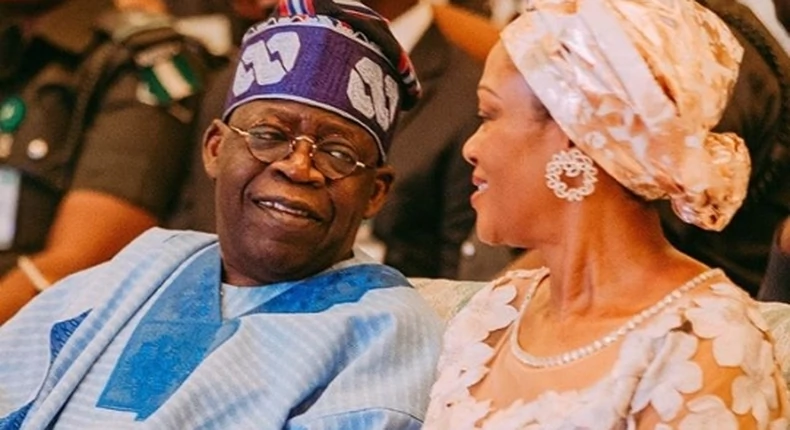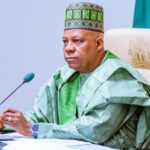It was raining heavily, so I told my pregnant wife that he wouldn’t make it. She had been discharged from the hospital earlier that day. A few days before, she had experienced what was diagnosed as preterm contractions, and the hospital recommended her admission. She spent three days there. Our expected guest was coming on that account. He learnt about her health and promised to pay a visit. But it was raining. Our expected guest was Senator Kashim Shettima.
When my phone rang with his name, I was certain it was to apologise for not making it, but he was downstairs. I rushed to greet him and led him up, accompanied by a sizable entourage. My wife and I were not the only ones astounded by such honour; even the security guards would often refer to the visit with reverent perplexity as though they saw a ghost. It was July, 2022, the month he was announced as the vice presidential candidate of the ruling APC, becoming a figure who couldn’t afford to enter any residence in Nigeria unrecognised.
Sometime last week, while I was having a discussion with his colleague in the legislature, Hon Mansur Manu Soro, at the Abuja airport, I bumped into Hon Usman Zannah, a House of Representatives member from Borno State. He made reference to that unusual rainy day when he was part of the then vice presidential candidate’s entourage on the visit. “Don’t think that this man looks small,” he joked, “He’s quite mighty. The VP got us to visit him in the rain.” His colleague had a laugh, and he added, “We have visited his house five times.”
But for me, I had known this humane side of the politician earlier. After my infamous parlour wedding in Ramadan of 2021, my in-laws arranged a small walima (marriage banquet). Out of respect, I informed a few contacts, one of whom was the senator. My message was to request their prayers since it was on the eve of the event, and I was certain it was short notice. The senator responded instantly, saying that he had planned to attend the funeral of a notable figure in Kaduna, but added, “I would rather stay in Abuja and honour your invitation.” He ended up at the venue at the exact time before anyone else showed up. I was greatly embarrassed that he arrived before us.
Surprisingly, not many knew that this relationship began on the pages of newspapers. One day, my friend, Abdulrahman Leme, facilitated our first meeting through the senator’s then personal assistant, Ahmed Ningi. During the meeting, the senator reminded me that he was amused by my thought process in a syndicated think-piece I wrote about Nigeria’s historic tendency to disintegrate. He cited my use of Antonio Gramsci’s well-known cultural hegemony framework for analysis to depict the Nigerian elite as also guilty of exploiting identity politics to blindfold the masses.
That first in-person encounter would set the tone for the relationship we would have — based on mutual interests in books, authors, ideas, and, more importantly, the intellectual exploration of them. The admiration was mutual because, as a craftsman in the business of weaving words and phrases, I had repeatedly and openly confessed to appreciating his depth of thought and dedication to the elegance of language. He is not only a first-rate orator with a stimulating vocabulary but also a well-read one.
So, a few days after the encounter, he asked Mr Leme to inform “our friend”, referring to me, to assist him with a specific research task. He was polite and hesitant in the request, and I remember wondering why, as an elder in a society that affords him such a right, he didn’t just reach out to me directly to give me instructions. I later realised that he came through a third party because he didn’t want to put me in a position where I couldn’t say no to his request, a request inspired by his confidence in my research capability.
For over 10 years as a columnist, since debuting in Blueprint newspapers, I have taken critical stances on political and social issues. Sometimes, I was a lone voice in my quest for justice or pursuit of nuanced perspectives. I have endured a barrage of threats, been mislabeled by dissenters, and lost opportunities for taking these positions. I have even been deserted by friends in government who felt I should not carry out my civic responsibility — that of holding the government to account.
With Senator Shettima, there was neither judgment nor policing. He made it easy for me to muster the courage to send even unsolicited advice his way. Sometimes, I did so in person, other times via WhatsApp. He acknowledged them with a reverent ‘Okay, Sir,’ which always took me by surprise, and it’s a response to which I will never grow accustomed. Sometimes, when I sent him a piece of advice on a subject, I often asked myself whether I was overstepping boundaries. But he always welcomed them, and it never alarmed him to shut me out.
But then, I was merely practising the truth-telling virtue that he said impressed him. He also often emphasised the essence of criticism tradition in a democracy, and I was quite amused when I discovered his favorite political commentators, which included even his critics. The targets of my criticism have been multi-partisan, ruffling feathers across political parties and successive governments. But the Senator’s most recurring words were always the reminder that he admired me for my moral integrity, for standing by my principles against all odds.
So, when this man who has honoured me in a fashion that I didn’t deserve and reminded me to never compromise on my moral principles informed me of his plan to work with me after, I couldn’t even tell him what my friends had always known – that I had been deferring a PhD offer at one of my favourite institutions and had intended to go for it this September. I couldn’t say no because I doubt I would ever come close to a politician who values me this much, one who has given me the license to advise him freely. This is the rarest of privilege.
In my first group task for him, he instructed me to work with another potential appointee, Ms Rukaiya El-Rufai, who is now an elder sister and senior colleague I hold in high regard. A first-class graduate and fellow postgraduate alum of the London School of Economics, her workaholic spirit easily explains how she rose to become a partner at PwC. When she reviewed my input in the task, she said to me, “The Vice President truly has an eye for talent.” What she didn’t know was that I had said the same thing before her. I had told the Vice President the same thing in praising her – that he has an eye for talent.
Yesterday, with the announcement that President Bola Ahmed Tinubu had approved my appointment, along with others, as Senior Special Assistant to the President on Research and Analytics in the Office of the Vice President, this invitation became official. It also brought to mind Senator Shettima’s caveat, that I must brace myself for the baptism of fire, as it’s the first rite of passage to the corridor of power. But anyone who knows me would quickly observe that I have the skin of a rhino. It’s not criticism that scares me; it’s becoming what I used to criticise. This, as painful as it may sound, marks the closing piece of this column, a long way to say goodbye. But I hope to return after the storm.

 Join Daily Trust WhatsApp Community For Quick Access To News and Happenings Around You.
Join Daily Trust WhatsApp Community For Quick Access To News and Happenings Around You.


